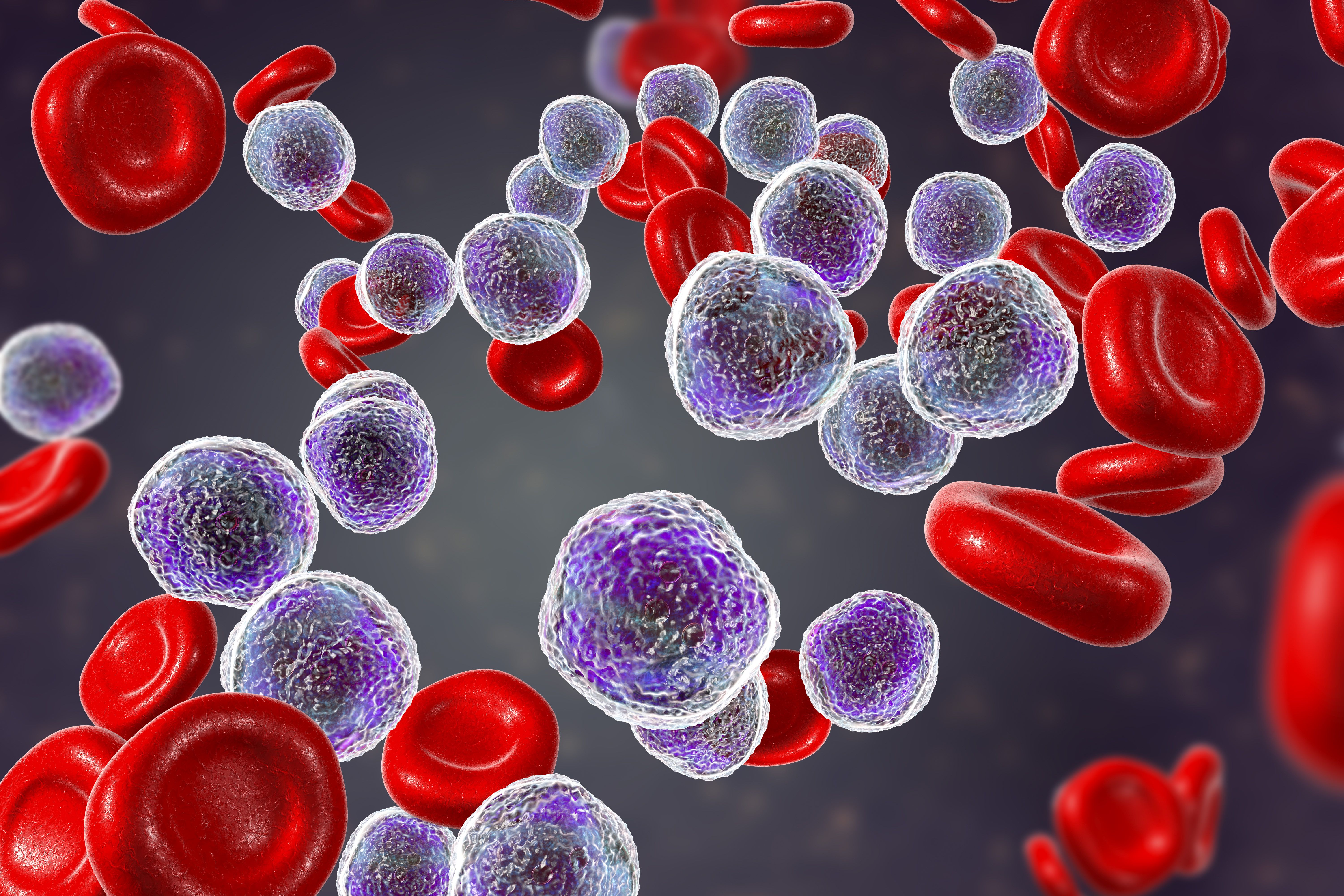Blinatumomab Improves 3-Year Survival in B-ALL vs Chemotherapy
Findings from the phase 3 E1910 study showed that blinatumomab extended overall survival when added to chemotherapy vs chemotherapy alone in B-cell precursor acute lymphoblastic leukemia.
Acute lymphoblastic leukemia cells - stock.adobe.com

An overall survival (OS) benefit was observed when the immunotherapy blinatumomab (Blincyto) was added to consolidation chemotherapy in patients with B-cell precursor acute lymphoblastic leukemia (B-ALL) with negative measurable residual disease (MRD) and BCR::ABL1-negative disease.1,2
Findings from the phase 3 E1910 study (NCT02003222) were published in The New England Journal of Medicine and showed that, at a median follow-up of 43 months, there was a 3-year OS rate of 85% with the bispecific monoclonal antibody blinatumomab vs 68% with chemotherapy alone (HR, 0.41; 95% CI, 0.23-0.73; P =.002). The 3-year recurrence-free survival (RFS) rate was 80% with blinatumomab vs 64% in the control arm (HR, 0.53; 95% CI, 0.32-0.87).
Authors noted that while the study was not powered sufficiently for subgroup analyses, patients under the age of 55 appeared to have the greatest benefit from blinatumomab.
Regarding safety, 479 patients were evaluable for treatment-related adverse events (TRAEs). Among patients who were MRD-negative and receiving blinatumomab, nonhematologic TRAEs of grade 3 were reported in 43%, grade 4 in 14%, and grade 5 in 2%. In the MRD-negative chemotherapy group, these numbers were 36%, 15%, and 1%, respectively (P =.87). Neurologic or psychiatrics grade 3 or higher AEs were reported in 23% of patients in the blinatumomab arm vs 5% in the chemotherapy arm (P <.001).
In June 2024, the FDA approved blinatumomab for the treatment of patients with CD19-positive B-ALL, supported by the E1910 study.3 Additionally, in June 2023, the FDA approved the agent in MRD-positive B-ALL.4
At the 2022 American Society of Hematology Annual Meeting, findings from the E1910 study showed that blinatumomab followed by consolidation chemotherapy achieved a 58% reduction in the risk of death compared with standard consolidation chemotherapy alone in adult patients with newly diagnosed MRD-negative B-ALL.5 The median OS with blinatumomab plus chemotherapy was not reached compared with 71.4 months with chemotherapy alone (HR, 0.42; 95% CI, 0.24-0.75; P =.003).
“This trial, E1910, showed for the first time, an overall survival advantage for adult patients with MRD-negative BCR-ABL–negative B-lineage acute lymphoblastic leukemia who receive blinatumomab combined with chemotherapy,” lead study author Mark R. Litzow, MD, a professor of medicine in the Division of Hematology at Mayo Clinic, said in a press briefing during the meeting. “We feel that this represented a new standard-of-care for this group of patients and should be incorporated into their standard therapy.”
REFERENCES:
1. Litzow MR, Sun Z, Mattison RJ, et al. Blinatumomab for MRD-negative acute lymphoblastic leukemia in adults. N Engl J Med. 2024;391:320-333. doi:10.1056/NEJMoa2312948
2. Adding blinatumomab to consolidation chemotherapy improves OS in adult patients in MRD-negative remission from BCP-ALL. News release. ESMO. August 12, 2024. Accessed August 14, 2024. https://tinyurl.com/yzxuc5c2
3. FDA approves blinatumomab as consolidation for CD19-positive Philadelphia chromosome-negative B-cell precursor acute lymphoblastic leukemia. News release. FDA. June 14, 2024. Accessed August 14, 2024. https://tinyurl.com/3px58wm4
4. FDA grants full approval for Blincyto® (Blinatumomab) to treat minimal residual disease-positive b-cell precursor acute lymphoblastic leukemia. News release. Amgen. June 21, 2023. Accessed August 14, 2024. https://tinyurl.com/2bamekp2
5. Litzow MR, Sun Z, Paletta E, et al. Consolidation therapy with blinatumomab improves overall survival in newly diagnosed adult patients with B-lineage acute lymphoblastic leukemia in measurable residual disease negative remission: results from the ECOG-ACRIN E1910 randomized phase III National Cooperative Clinical Trials Network Trial. Blood. 2022;140(suppl 2):LBA-1. doi:10.1182/blood-2022-171751
First Dose of CD38-Targeting CAR T-Cell Therapy Administered in AML
January 22nd 2025The first patient with relapsed/refractory acute myeloid leukemia has received KJ-C2320, an allogeneic CAR T-cell therapy targeting CD38 and developed using the THANK-uCAR platform, in an investigator-initiated trial in China.
Read More